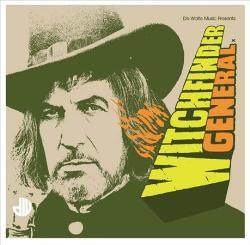Given that Cathedral once sampled Vincent Price in his role from The Witchfinder General, it comes with little surprise that there’d be at least some musical interest attached to the 1968 film; a lurid, compelling slice of horror exploitation and centuries-old setting that seems almost foreordained to grab the imagination of not just metal but anything touching on hidden English history beneath the gilt veneer. (Given the recent release of A Field in England, the timing almost seems right for a look back). Paul Ferris’ score for the film is the focus here though, and in keeping with other selections from the legendary De Wolfe library, it’s not so much invocations via feedback as orchestral moments and themes.
The Witchfinder General isn’t quite a soundtrack that stands up on its own merits on balance – it doesn’t tell a story as clearly as other examples of the form do away from the visual element, and most of the pieces here are essentially the stripped down cues from the presentation itself (the second track itself is called ‘Drama Sting No. 1’, for instance, and barely lasts for a couple of seconds, while other tracks have fairly general names like ‘Action Mood’). Those completely dyed in the wool of the film will be able to follow along very easily, but first time listeners might almost be suggested to just go to the film first before coming back to this.
In its own right the soundtrack contains both functional and occasionally striking moments – it’s the first presentation of the complete soundtrack from the source tapes, so that’s reason enough for interest from a cinematic and technical angle. A fair amount of the selections feel very specifically of their own time rather than that of the film’s setting, standard bursts of action arrangements with percussive touches pitched somewhere between nervousness and, perhaps unintentionally, goofy zaniness. (In contrast, consider the use of De Wolfe library music for Monty Python and the Holy Grail: it’s famously stone dead serious, letting the film itself bring the humor.) But when heard as its own self-contained effort rather than ranked against splashier soundtracks, especially with more recent technology, the pocket economy evident in the wracking ‘Stearne Attacks Sara’, for instance, is up to the needs at work.
‘Interrogation Of The Priest’ is a good example of Ferris’ best approach, strings very quietly stretching out after an initial figure to suggest lingering tension, something never fully resolved but certainly not uneasy. This repeats during the track, suggesting the corresponding rise and fall in intensity of the scene before ending quietly and uncertainly. Similarly ‘In the Shadows’ and ‘Not Selling’ shows how he can often suggest rather than completely clout over the head; if the latter has some conventional older horror movie touches at points, it still feels a little uneasy and overbalanced, like something REALLY bad might go down. Meanwhile, songs like ‘Richard Rides to Sara’ and the fairly similar ‘Soft Interlude’ and ‘Peaceful Interlude’ hint, just, at a bit of pleasant folk music memory in their arrangements, an inevitable calm before the rest of the movie’s storm.
The Witchfinder General in part serves as a memorial to what film music could be expected to be in a time of mono or stereo presentations at most, not aiming at the deepest nor highest possible frequencies, feeling like something encountered on TV at a late night hour and not quite right as a result. But then again, that’s part of the appeal.


